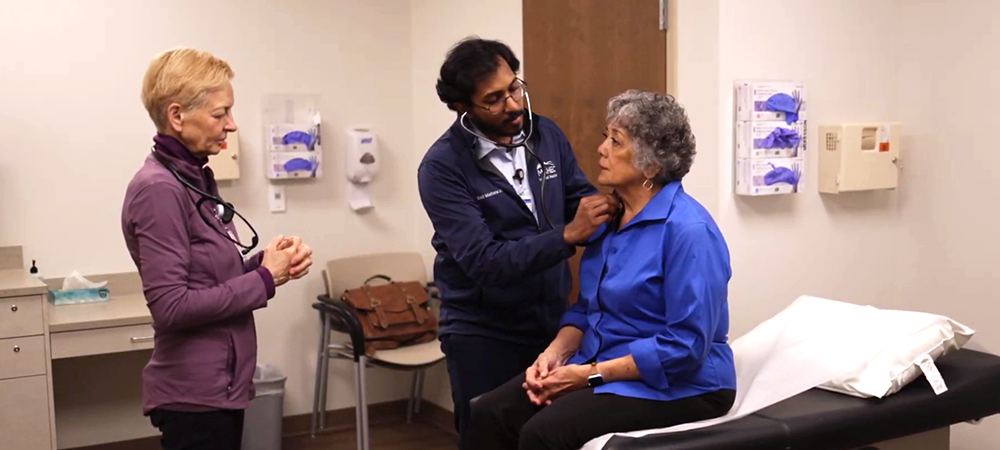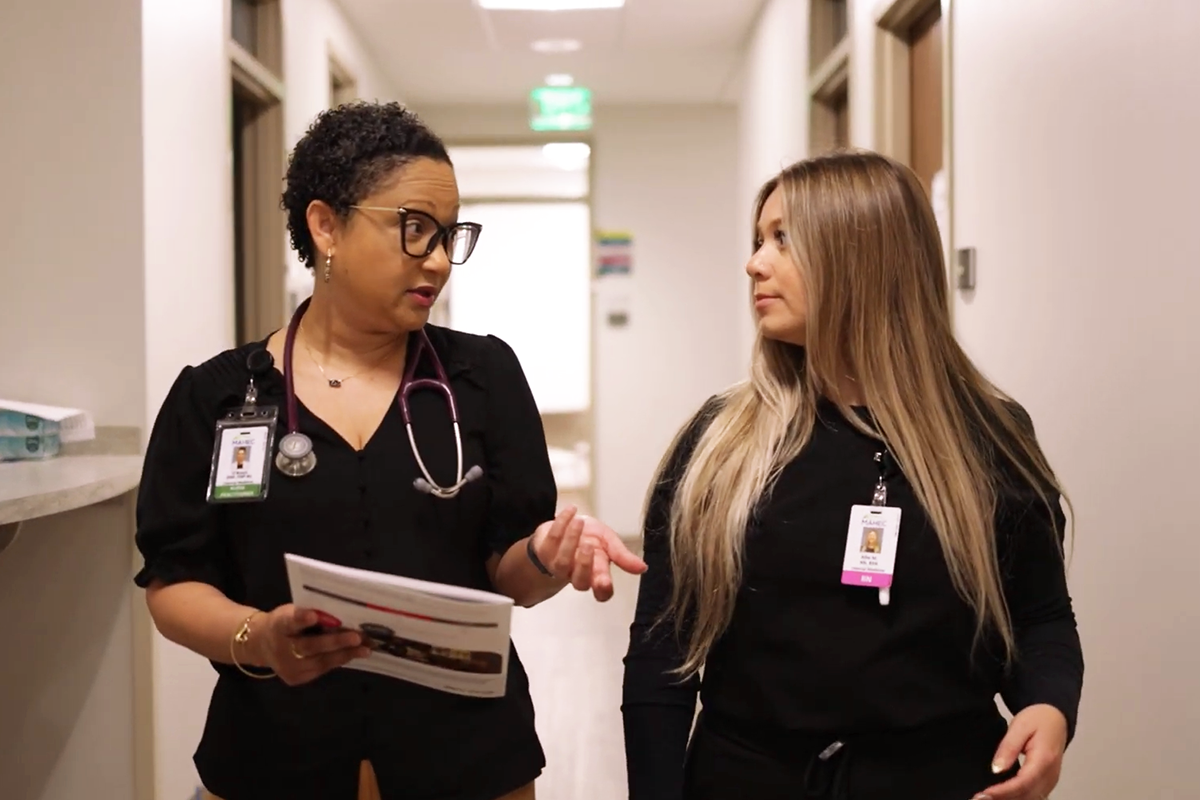
Internal Medicine Residency



Our program is designed in a competency-based advancement structure. Individuals are continuously observed, assessed and provided with feedback in all experiences. Goal-setting is based on Internal Medicine milestones. Once an individual achieves competency in a goal, they set new goals and are advanced in their level of responsibility. As such, we use a competency-based language to define stages of development rather than a time-based language.
Learner |
Manager |
Teacher/Leader |
||
| Our learners move through phases of development—from Learner (PGY1 year) to Manager (usually end of PGY1 year into PGY2 year) to Teacher/Leader (usually mid PGY2 year to end of training). | ||||
In the learner phase of training, an individual works under close supervision and coaching to achieve basic milestones in Internal Medicine. We use a deliberate practice model in which learners set milestone-based goals; work to develop knowledge, skills, and attitudes with direct observation and feedback from faculty, seniors, and team members; and then, based on feedback, set new goals. Supervisors are trained in "supervised autonomy" as a principle so that learners are not "directed" but coached to grow.
"I really appreciate the strong mentorship in this program. The attendings are approachable and genuinely invested in our growth, providing guidance and support that help us develop both professionally and personally. The frequent feedback has greatly helped my growth and improvement."
— PGY2 Resident
Once a learner reaches competency in all learner-level milestones, they advance to the manager phase of training. In this phase, one works to establish independence in the management of common Internal Medicine ambulatory and inpatient patient presentations. Our managers do not supervise learners, nor are they supervised by upper-level residents. They work collaboratively on manager-level rotations with attending physicians to establish competence. Residents consider this the most challenging and most rewarding phase of training as they truly grow into clinical independence in this phase.
Once a manager is considered independent in managing most common medical conditions, they advance to the leader/teacher phase of training. In this phase, they continue to gain the necessary experience over time in managing many medical conditions and they work on teaching and leadership skills. Their milestones during this phase are worded as phrases such as "can teach others...", "leads a healthcare team", "coordinates care across...", "role models for others...". It is in this level of training that our residents lead teams on the wards, in the ICUs, specialize in consultative care, and serve in advanced roles in the ambulatory practice setting.
"One of the standout aspects of this program is the excellent opportunities for leadership and autonomy. As a 2nd and now 3rd year resident, I feel empowered to take on responsibility and teaching."
— PGY3 Resident

Our unique tandem block schedule was designed by residents and studied in an Internal Medicine residency. The schedule was created with the following goals in mind:
The tandem block schedule pairs four-week direct patient care inpatient experiences (wards, icu, specialty services - designated as "I" in schematic below) with other experiences (ambulatory, consults, research, electives - designated as A) in an alternating eight-week block schedule. The "A" designation indicates that the resident has continuity clinic three half-days per week during that rotation. The residents are partnered together in practice partnerships so that one of the partners is always in clinic that week and manages outpatient responsibilities for the patient panels during that time. Residents do not have clinic during "I" blocks.
"One of the biggest things I adore is their tandem block schedule. The ability to spend more time outpatient consistently allows you to get that true continuity of patient care. It’s also very nice for your mental well-being, not having to be stuck necessarily in the hospital or in clinic, gives you time to relax, do something different, and take care of things in your outside life that working outpatient allows a little more."
— PGY1 Resident
The schematic below represents two residents’ schedules for the first 16 weeks of a year. Each column is two weeks. John and Stacey are clinic partners. They are in clinic three half-days per week on A blocks.
| Block Number (each block is two weeks) |
|---|
| Resident | 1A | 1B | 2A | 2B | 3A | 3B | 4A | 4B |
| John | ICU (I) | Pulm (A) | ICU (I) | Pulm (A) | Wards (I) | Amb (A) | Wards (I) | Amb (A) |
| Stacey | Geri (A) | Wards (I) | Geri (A) | Wards (I) | Amb (A) | Cards (I) | Amb (I) | Cards (I) |
| Rotations: Learner Phase | Weeks | Location |
|---|---|---|
| General Internal Medicine Wards | 12 weeks | Mission Hospital |
| Medical ICU | 4 weeks | Mission Hospital |
| Night Medicine | 4 weeks | Mission Hospital |
| Emergency Medicine | 4 weeks | Mission, Other |
| Ambulatory Block | 4-6 weeks | MAHEC |
| Geriatrics - Ambulatory | 4 weeks | MAHEC |
| Rural Health | 2 weeks | Multiple Sites |
| Hematology/Oncology - Ambulatory | 2 weeks | Messino Cancer |
| Neurology - Ambulatory | 2 weeks | Asheville Neurology |
| Cardiology Consults | 4 weeks | Mission Hospital |
| Psychiatry - Ambulatory & Inpatient | 2 weeks | MAHEC, Mission |
| Sports Medicine | 2 weeks | MAHEC |
| Elective | 2-4 weeks | Multiple Sites |
| Rotations: Manager Phase | Weeks | Location |
|---|---|---|
| General Internal Medicine Wards | 10 weeks | Mission Hospital |
| Nephrology Inpatient Consults | 4 weeks | Mission Hospital |
| CCU / Night ICU | 8 weeks | Mission Hospital |
| Infectious Disease Consults | 2 weeks | Mission Hospital |
| Rheumatology - Ambulatory | 2 weeks | Asheville Arthritis |
| Rural Health - Immersion | 4 weeks | Cherokee |
| Endocrinology - Ambulatory | 4 weeks | MAHEC |
| QSW (Quality, Safety, Wellness) | 2 weeks | Mission Hospital, MAHEC |
| Community Health | 4 weeks | MAHEC and partners |
| Individualized Rotations (electives/scholarship) | 12 weeks | MAHEC, Other |
| Rotations: Leader/Teacher Phase | Weeks | Location |
|---|---|---|
| General Internal Medicine Wards | 8 weeks | Mission Hospital |
| Procedures | 2 weeks | Mission Hospital |
| Cardiology Consults | 4 weeks | Mission Hospital |
| Gastroenterology Consults | 4 weeks | Mission Hospital |
| Addiction | 2 weeks | ADACT |
| Night Medicine | 4 weeks | Mission Hospital |
| ICU | 4 weeks | Mission Hospital |
| QSW (Quality, Safety, Wellness) | 2 weeks | Mission Hospital, MAHEC |
| Palliative Care | 2 weeks | Multiple Sites |
| Ambulatory Urgent Care | 4 weeks | MAHEC |
| Transition to Practice | 4 weeks | Mission Hospital, MAHEC |
| Individualized Rotations (electives/scholarship) | 12 weeks | MAHEC, Other |
| Conferences* |
|---|
| Time | Monday | Tuesday | Wednesday | Thursday | Friday |
| 7:15 am | Ambulatory Morning Report | Board Prep or Case Presentation | Journal Club | Ambulatory Morning Report | Ambulatory Morning Report |
| 12:00 pm | Inpatient Noon Report | Inpatient Noon Report | UNC Grand Rounds | Inpatient Noon Report | |
| Afternoon | Academic Half Day (Active Learning) |
*Ambulatory Morning Report includes EKG interpretation, MSK radiology rounds, psychiatry cases, lifestyle medicine, and topic-based sessions. Friday Inpatient Noon Report includes clinical reasoning series for interns.
